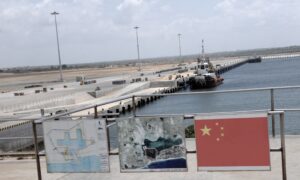China Could Use ‘Usurious’ Loans to Hurt America and Its Partners: Former Energy Department Official
China could use its unconventional debt practices as an exercise of power against America and its partners, according to Bart Marcois, former U.S. deputy assistant secretary for policy and international affairs in the Department of Energy.“Let’s imagine that China increases its threats to Taiwan, for example. Let’s imagine that it actually attacks Taiwan. Any country that assists the United States in assisting Taiwan would then have their loans called, due immediately. They would face immediate financial pressure,” Marcois said in a Sept. 22 interview with NTD News, The Epoch Times’ sister media. ‘Loan Sharking’ The former George W. Bush administration official called the regime’s lending practices “loan sharking.” “China’s lending practices are predatory … They’re going to places that can’t get a loan by walking up to the service counter of an international bank and saying, ‘We would like to take out a loan to finance this project or that project,’” he said. The Chinese regime would then offer that country a loan at “usurious” rates, Marcois said. If the country fails to pay—for instance, on a loan for the construction of a port, China will simply “take over ownership of the port,” he said, with the result that China would then own a port in the debtor country. Money Laundering In addition to loan sharking, China’s lending practices, in Marcois’s words, also include “money laundering.” “Because they’re lending, say, $3 billion to build a port that would cost maybe $750 million,” while the excess funds go to various Chinese Communist Party officials and their family members, he noted, as well as to corrupt officials in the country that took on the loan. “[When] the President or Prime Minister or finance minister in the poor country that makes the deal … retires after a few years, he still has his billion dollars in Switzerland or the Cayman Islands, and the country is left to pay off the loan,” Marcois said. “Meanwhile, he has laundered that money with Chinese assistance and with the assistance of banks all over the world.” Energy Security Is Key Over-spending by the current administration is weakening U.S. standing in international markets, Marcois stressed, while strengthening China’s standing: “They hold the cash, they hold the money and they hold financial power. They’re using this as an instrument of state power.” In Marcois’s opinion, energy security is the most effective way for the United States to push back on China. “[The] most important thing we can do is start producing energy, our own energy, making ourselves energy independent and making ourselves more financially independent, more financially secure,” Marcois said. Marcois also stressed the importance of cutting federal spending and easing the federal tax burden: “because that’s what’s driving inflation.” Follow Hannah Ng is a reporter covering U.S. and China news. She holds a master's degree in international and development economics from the University of Applied Science Berlin. Follow

China could use its unconventional debt practices as an exercise of power against America and its partners, according to Bart Marcois, former U.S. deputy assistant secretary for policy and international affairs in the Department of Energy.
“Let’s imagine that China increases its threats to Taiwan, for example. Let’s imagine that it actually attacks Taiwan. Any country that assists the United States in assisting Taiwan would then have their loans called, due immediately. They would face immediate financial pressure,” Marcois said in a Sept. 22 interview with NTD News, The Epoch Times’ sister media.
‘Loan Sharking’
The former George W. Bush administration official called the regime’s lending practices “loan sharking.”
“China’s lending practices are predatory … They’re going to places that can’t get a loan by walking up to the service counter of an international bank and saying, ‘We would like to take out a loan to finance this project or that project,’” he said.
The Chinese regime would then offer that country a loan at “usurious” rates, Marcois said. If the country fails to pay—for instance, on a loan for the construction of a port, China will simply “take over ownership of the port,” he said, with the result that China would then own a port in the debtor country.
Money Laundering
In addition to loan sharking, China’s lending practices, in Marcois’s words, also include “money laundering.”
“Because they’re lending, say, $3 billion to build a port that would cost maybe $750 million,” while the excess funds go to various Chinese Communist Party officials and their family members, he noted, as well as to corrupt officials in the country that took on the loan.
“[When] the President or Prime Minister or finance minister in the poor country that makes the deal … retires after a few years, he still has his billion dollars in Switzerland or the Cayman Islands, and the country is left to pay off the loan,” Marcois said.
“Meanwhile, he has laundered that money with Chinese assistance and with the assistance of banks all over the world.”
Energy Security Is Key
Over-spending by the current administration is weakening U.S. standing in international markets, Marcois stressed, while strengthening China’s standing: “They hold the cash, they hold the money and they hold financial power. They’re using this as an instrument of state power.”
In Marcois’s opinion, energy security is the most effective way for the United States to push back on China.
“[The] most important thing we can do is start producing energy, our own energy, making ourselves energy independent and making ourselves more financially independent, more financially secure,” Marcois said.
Marcois also stressed the importance of cutting federal spending and easing the federal tax burden: “because that’s what’s driving inflation.”













